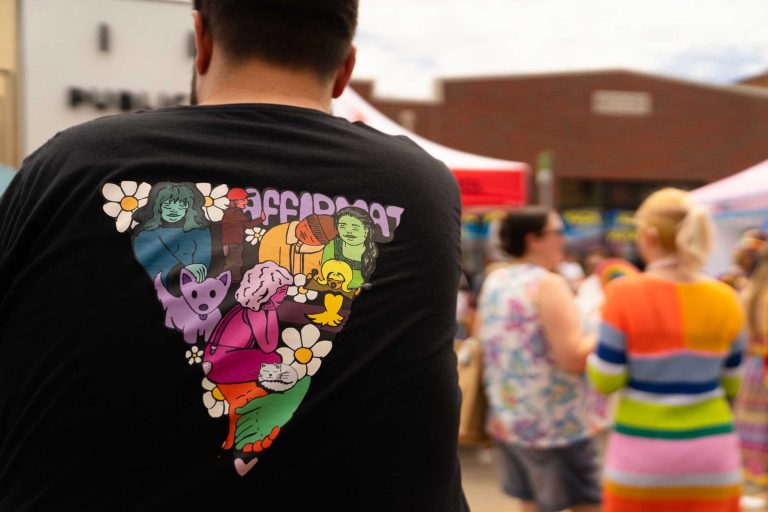Affirmations Responds to the Need for Inclusive Mental Health Care
Members of the LGBTQ+ community in southeast Michigan face significant barriers when seeking mental health care. Too often, providers lack the training to support LGBTQ+ clients in ways that truly affirm who they are. That disconnect can lead to mistrust, isolation and untreated mental health needs.
Based in Ferndale, Affirmations Community Center has long served as a safe and affirming space for LGBTQ+ individuals and families. In addition to support groups, housing navigation and basic needs assistance, Affirmations offers mental health services that are specifically designed to meet the needs of LGBTQ+ clients.
Over time, staff at Affirmations began to notice a troubling pattern. Community members shared story after story about negative experiences with local therapists — providers who hadn’t incorporated preferred names or pronouns, intake forms that didn’t reflect their identities or environments that simply didn’t understand their needs.
“We hear stories all the time of people who sought mental health services and didn’t feel safe,” says Cate Spinney, Director of Health and Human Services at Affirmations. “People who left the therapy setting feeling as though the system was not equipped to meet their needs.”
Those conversations made something clear: many providers want to be supportive, but lack the training to offer meaningful, inclusive care.
“We want people to know they’re safe here. That’s our job,” Spinney says. “But we also know that not everyone can come to us. That’s why we’re building something bigger.”
Increased vulnerability can impact mental health
The need for affirming care is only becoming more urgent. Spinney points to a wave of anti-LGBTQ+ legislation, court rulings that roll back civil rights protections and cultural rhetoric that has emboldened discrimination.
“Being queer or trans is not the problem,” she says. “It’s the hate we experience. It’s the discrimination we experience. It’s the legislation that strips away our rights, our bodily autonomy, our families’ rights to support us.”
These external pressures, she explains, are directly impacting the mental health of the community. “We’re going to see more suicide, more depression, more anxiety, more trauma,” Spinney says. “Because we’re creating a culture where it’s unsafe to be who you are.”
Growing a community of trained, trusted providers
To meet this rising need, Affirmations is taking steps to expand access to safe, identity-affirming care beyond its own walls.
Affirmations is developing a training initiative for mental health professionals across southeast Michigan. The program is designed to help providers deliver care that is respectful and deeply informed by the experiences of LGBTQ+ clients.
“We’re building out a training program that would lead to an ‘Affirmations-approved’ designation, so we can send people to clinicians in the community who we know are safe,” Spinney says.
The goal is to build a vetted referral network — a resource that LGBTQ+ clients can turn to with confidence, especially in areas where affirming providers can be hard to find.
What training will include
The program will offer tools and strategies for providing identity-affirming, trauma-informed care. Training topics include inclusive language, intake processes that respect clients’ identities, and the importance of cultural humility.
Clinicians will also learn how to respond when they get something wrong — a moment that can be deeply important in maintaining or repairing trust.
“You can’t be in this work without understanding the people you’re serving,” Spinney says.
Affirmations sees this training as the beginning of an ongoing process. “This isn’t a one-and-done training,” Spinney says. “We’re looking to partner with providers who are open to reflection, growth and doing this work over time.”
A broader impact, one provider at a time
Spinney envisions the training creating ripples throughout the region. Each provider who completes the program brings that learning back into their clinic, practice, or school setting, making more spaces safer and more responsive to the needs of the LGBTQ+ community.
The work isn’t about perfection, Spinney emphasizes. It’s about consistency, empathy, and being willing to center clients’ experiences. “It’s not about gatekeeping. It’s about creating a standard of care that our community deserves,” she says.
An invitation to do better, together
Affirmations doesn’t expect to solve the care gap alone. Instead, the organization is inviting others to take part in building something better. “We want to be part of the solution, and we want you to be part of it too,” Spinney says.
For mental health professionals, that might start with training. But it also means reviewing office practices, asking better questions, and listening more deeply to LGBTQ+ clients. The need is urgent, but the path forward is clearer when shared.
“We don’t expect everyone to know everything,” Spinney says. “But we do expect people to try. That effort can be life-changing for someone who just wants to be seen and supported for who they are.”
Learn more about Affirmations Community Center.

